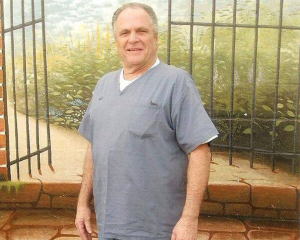The House has finally aligned itself with the will of the American people when it comes to marijuana policy.
In a long-overdue but welcome move, the Commission on Narcotic Drugs has voted to remove marijuana from Schedule IV of the UN's 1961 Single Convention on Narcotic Drugs.
In the wake of victories in Congress and at the UN, we seek your continued support. Your donation will be matched too.
A western Pennsylvania deputy had a most interesting stash hidden behind his basement wall, a south Alabama small town police officer tries his hand at meth dealing, and more.
Republicans seek to make political hay out of the looming House vote on marijuana legalization, a New Mexico criminal justice reform coalition gears up to push for pot legalization there, and more.
Tomorrow will be a historic day for marijuana policy, New Jersey lawmakers struggle over legal marijuana and decriminalization, Peru and the US diverge on the size of last year's coca crop, and more.
South Dakota's attorney general's office intervenes against a challenge to the state's voter-approved marijuana legalization, New Jersey's governor and lawmakers reach an agreement on their marijuana bill, and more.
A state senator is leading a push for a marijuana legalization initiative in Nebraska, the new progressive Los Angeles County DA is getting down to work, and more.
More than a dozen marijuana reform bills have been filed in Texas, Canada will allow a small number of health professionals to possess and use magic mushrooms to help them better serve their mushroom-using patients, and more.
The House has passed the Medical Marijuana Research Act, America's longest-serving nonviolent marijuana prisoners is now a free man, and more.
Breaking almost entirely along party lines, the House on Friday voted to approve the Marijuana Opportunity Reinvestment and Expungement Act of 2019 or the MORE Act of 2019 (HR 3884). The vote was 228 to 164, with only a handful of Republicans voting "aye" and a handful of Democrats voting "nay."

Friday was an historic day on Capitol Hill. (Creative Commons)
The MORE Act would effectively end federal pot prohibition by removing marijuana from the Controlled Substances Act's list of scheduled substances and eliminating federal criminal penalties for its possession, cultivation and sale. The bill would not affect state laws that criminalize marijuana, but it would end the conflict between states that have already legalized marijuana and federal law.
The bill also includes strong social equity provisions, including the creation of a fund to support programs and services for communities devastated by the war on drugs, a provision for expungement of past federal marijuana offenses, and a provision that bars the federal government from discriminating against people for marijuana use. The latter would protect immigrants from being deported for past marijuana convictions and would ensure that earned benefits are not denied to marijuana users.
The historic vote marks the first time either chamber of Congress has voted for legalization. But there is virtually no chance that the Republican-led Senate will take up -- let alone approve -- the measure in the remaining days of this session, meaning this is a battle that will continue in the next Congress.
Still, drug policy reformers were quick to celebrate the victory.
"Today's vote marks a historic victory for the marijuana policy reform movement. It indicates that federal lawmakers are finally listening to the overwhelming majority of Americans who are in favor of ending prohibition and comes at a critical time as this important measure addresses two key challenges we currently face," Marijuana Policy Project executive director Steven Hawkins said in a statement moments after the vote ended.
"Serious criminal justice reform cannot begin in our country without ending the war on cannabis," Hawkins continued. "The MORE Act would set federal marijuana policy on a path toward correcting an unfair system and help restore justice to those who have been victimized by prohibition. This legislation would also help address our country's fiscal and economic challenges by empowering states to implement programs that can stimulate economic growth and generate new tax revenue at a time when both are desperately needed. We call on the Senate to listen to the American people and pass the MORE Act without delay."
"This is HUGE!" said the National Organization for the Reform of Marijuana Laws (NORML) in a blog post announcing the vote. "This is an historic day for marijuana policy in the United States. This vote marks the first time in 50 years that a chamber of Congress has ever revisited the classification of cannabis as a federally controlled and prohibited substance, and it marks the first time in 24 years -- when California became the first state to defy the federal government on the issue of marijuana prohibition -- that Congress has sought to close the widening chasm between state and federal marijuana policies."
"The criminalization of marijuana is a cornerstone of the racist war on drugs. Even after a decade of reform victories, one person was arrested nearly every minute last year for simply possessing marijuana," Maritza Perez, director of the Office of National Affairs at the Drug Policy Alliance (DPA) said in a statement. "Today the House took the most powerful step forward to address that shameful legacy. But the MORE Act as passed is imperfect, and we will continue to demand more until our communities have the world they deserve."
DPA is particularly irked by the insertion of language during the legislative process that limits expungement and resentencing provisions to people with nonviolent marijuana offenses and language that blocks people with marijuana felony convictions from fully participating in the industry. The group said in the statement that it would work with Congress next session "to remove these additions and pass a bill that fully aligns with our principles."
"Getting to this point definitely gives us hope, but the fight is far from over. We will continue to build support for an even stronger, and more inclusive bill in the next session," Queen Adesuyi, policy manager for DPA's Office of National Affairs, said in the statement. "We are grateful that members of Congress have rightly come to the realization that the drug war has exacerbated the racial injustices in this country and ending marijuana prohibition is a concrete tangible action they can take to benefit our communities now."
Not everyone was happy, though. America's leading anti-pot activist, Kevin Sabet, president and co-founder of Smart Approaches to Marijuana lashed out at the vote and the House leadership in a statement that called it "a useless show vote."
"The pot industry has won a post-season exhibition game, but they're treating it like Game 7 of the World Series," he snarked. "The bill is a smokescreen for Altria Phillip Morris and their Big Tobacco gang of investors. As we have seen in state after state, marijuana commercialization does not lead to any tangible benefit for disadvantaged communities and social equity programs continue to be manipulated. Legalization simply results in rich, overwhelmingly white men getting richer while using predatory marketing tactics to expand substance abuse in the communities that were somehow supposed to benefit. Big Pot doesn't care about social justice or equity, its only concern is profit."
But while Sabet goes on about his mythical "Big Pot," he neglects to mention who actually supports the bill: the American people. In the latest Gallup poll, released less than a month ago, 68% said they wanted legal marijuana. They may have to wait for NORHWWE Congress to get in done at the federal level, but passage of the MORE Act is in line with what the public wants, even if prohibitionists don't wish to acknowledge that.
The Drug Policy Alliance is a funder of Drug War Chronicle.
back to top
In an historic vote Wednesday, the 53 member states of the Commission on Narcotic Drugs, the UN body charged with setting drug policy, voted to remove cannabis from Schedule IV of the United Nations' drug classification system as they met in Vienna.

Vienna International Centre
The vote followed an
independent scientific assessment undertaken by some of the world's leading experts convened by the World Health Organization (WHO) in 2017 and 2018. The Geneva-based WHO is charged under the UN drug conventions with assessing the harms and benefits of substances and making scheduling recommendations. In January 2019,
the WHO formally recommended that cannabis be removed from Schedule IV and that CBD cannabis preparations containing less than 0.2% THC, such as tinctures and extracts, be removed from the schedules altogether.
While civil society groups gave the WHO's recommendations decidedly mixed reviews, including its "very questionable rationale for keeping cannabis in Schedule I," they also applauded its "obvious recommendations deserving support." The removal of cannabis form Schedule IV in particular would signify UN recognition that cannabis really does have therapeutic uses.
As explained in an October briefing paper from the International Drug Policy Consortium and the Transnational Institute, cannabis is currently both a Schedule I and a Schedule IV drug under the international drug treaties. Schedule I includes "substances that are highly addictive and liable to abuse or easily convertible into those (e.g. opium, heroin, cocaine, coca leaf" -- although Bolivia begs to differ on the latter), while Schedule IV includes Schedule I drugs with "particularly dangerous properties and little or no therapeutic value" (e.g. heroin, carfentanil).
Wednesday's vote removing cannabis from Schedule IV means the global anti-drug bureaucracy now recognizes the therapeutic value of cannabis and no longer considers it "particularly liable to abuse and to produce ill effects."
With medical marijuana legal in dozens of countries in one form or another, the ever-increasing mountain of evidence supporting the therapeutic uses of cannabis, not to mention outright legalization in 15 American states Canada and Uruguay, with Mexico about to come on board, this decision by the CND is long past due, but nonetheless welcome.
"With this decision, the UN closes a 60-year denial of what has been documented as being among the most ancient medicinal plants humankind has domesticated," said independent researcher Kenzi Riboulet-Zemouli, who has monitored the CND process for years.
It will be 60 years in March since cannabis was placed in Schedule IV of the 1961 Single Convention on Narcotic without ever having been subject to any scientific assessment.
"As a medical patient myself I know how necessary this change in international law is, to help reduce the suffering of millions of people and how it adds a much needed pain treatment with promise in mitigating reliance on opiates at a key moment in history," said Michael Krawitz, executive director of Veterans for Medical Cannabis Access (USA), one of the global civil society groups that has been pushing for reform at the UN.
While the CND accepted the WHO's recommendation to remove cannabis from Schedule IV, it failed to advance some other recommendations, including rejecting a recommendation on medical CBD. That means CBD remains unscheduled, outside treaty controls, and liable to national bans. The failure to adopt more progressive WHO recommendations was "disappointing and represents a lost opportunity to make the treaty best fit to purpose," activists said.
But this is the United Nations, and change comes at a glacial pace and even then, only incrementally. Still, Tuesday's vote is a long overdue step in the right direction and lays the groundwork for more progress in years to come.
back to top
Dear supporter,
As you may have read about in
our newsletter, last week held historic wins for marijuana reform! The US House of Representatives passed a comprehensive bill -- the MORE Act -- which means marijuana legalization across the US is on the horizon. And in a major win globally, the United Nations removed marijuana from its most restrictive category, recognizing its medical value.
Are you able to contribute today to support our efforts to pass the MORE Act in the US Senate and make it law? Any contribution will be matched and your impact will be doubled!
If you are not able to contribute to our work monetarily, please consider sharing the link to our facebook fundraiser on your personal facebook page so we can connect with more allies.
The Marijuana Opportunity Reinvestment and Expungement (MORE) Act passed the US House last Friday December 4, making it the first ever marijuana legalization legislation to pass in any chamber of Congress. The MORE Act is especially notable for its focus on justice and equity through clearing past marijuana convictions and earmarking funds to reinvest in the communities most harmed by prohibition.
The vote on marijuana as medicine took place at the UN Commission on Narcotic Drugs, where it approved recommendation 5.1 made by the WHO Expert Committee on Drug Dependence. Previously marijuana was in Schedule IV of the 1961 convention, which recommends UN member states use their most strict controls for it.
Contribute to our marijuana legalization and other legislative efforts here. Donate to our UN and other educational and charitable programs (tax-deductible) here.
Learn more about the MORE Act news in our newsletter here. Learn more about the UN Commission on Narcotic Drugs vote here. Read about our work at the UN and other international programs here.
Thank You for your support!
Sincerely,

David Borden, Executive Director
StoptheDrugWar.org
P.O. Box 9853, Washington, DC 20016
https://stopthedrugwar.org
back to top
A western Pennsylvania deputy had a most interesting stash hidden behind his basement wall, a south Alabama small town police officer tries his hand at meth dealing, and more. Let's get to it:
In Susquehanna, Pennsylvania,
a Dauphin County sheriff's deputy was arrested last Tuesday after a search of his home uncovered firearms, drugs, and thousands of dollars in cash hidden behind a wall in his basement. Deputy Christopher Reid, 27, went down after a months-long investigation by Susquehanna Township police. The search turned up 11 guns, a half-pound of marijuana, and $28,000 in cash. He is facing a felony drug manufacturing/delivery charge, a misdemeanor drug charge, and a charge of endangering the welfare of children.
In Fulton, Missouri, a state prison guard was arrested last Tuesday for plotting to smuggle drugs into the prison there. Officer Randi Duvall, 35, went down after an investigation by the local sheriff's office, the Department of Corrections, and the US Postal Inspection Service. Postal inspectors tracked a suspicious package to Duvall's post office box, prompting a deputy to meet with Duvall, who then confessed. She is charged with the Class E felony of acceding to corruption.
In El Paso, Texas, an El Paso police officer was arrested last Friday for allegedly helping a cocaine dealer by running license plates of undercover police vehicles doing surveillance on him. Officer Monica Garcia was trying to thwart a DEA investigation of a dealer, and for her efforts, she now faces charges of conspiracy to possess cocaine with intent to distribute, conspiracy to unlawfully use a communication facility and conspiracy to maintain a drug-involved premise. She's looking at up to 20 years in federal prison.
In Pensacola, Florida, a south Alabama police officer was arrested Monday after being caught in a sting in which he was attempting to purchase meth for resale. Lt. Isaac Lopez, 36, of the Flomaton Police Department, is now charged with drug trafficking and using a two-way communication device to facilitate a felony. He was still sitting in the Escambia County Jail in Florida at last report.
In Greenbelt, Maryland, a former state prison guard was sentenced last Tuesday to 27 months in federal prison for smuggling drugs and other contraband into the Maryland Correctional Institute at Jessup in exchange for cash payments. Janel Martin had earlier pleaded guilty to federal racketeering charges. She is the third state prison guard to be convicted a broad anti-smuggling case that also saw nine other people charged.
back to top
Republicans seek to make political hay out of the looming House vote on marijuana legalization, a New Mexico criminal justice reform coalition gears up to push for pot legalization there, and more.

A vote on marijuana legalization looms in the House. (Creative Commons)
Congressional Republicans Use MORE Act Vote to Snipe at Democrats. GOP lawmakers are trying to score political points by attacking House Democrats for holding a vote this week on a marijuana legalization bill, the MORE Act (HR 3884). In a seemingly coordinated campaign, GOP members attacked the Democrats for taking up the MORE ACT before additional coronavirus relief is passed. Here's a representative tweet from House Minority Leader Kevin McCarthy (R-CA): "This week, your House Democrat majority is tackling the tough issues by holding a vote on legalizing pot and banning tiger ownership. Nothing for small businesses. Nothing for re-opening schools. Nothing on battling the pandemic. Just cannabis and cats."
New Mexico Criminal Justice Reform Coalition Gears Up to Press for Marijuana Legalization. Advocates for marijuana legalization have formed a criminal justice reform coalition, New Mexico Safe, to push for marijuana legalization. The group presented information to state lawmakers Tuesday night ahead of next year's legislative session, which begins next month. "This priority is one that obviously generates revenue and reinvest some of those dollars back into the public health system and back into communities that have been most harmed by substance use disorder," said Emily Katzenbach of the Drug Policy Alliance, which is a member of the coalition.
Medical Marijuana
Minnesota Adds Two More Qualifying Conditions for Medical Marijuana. The state Department of Health has added sickle cell disease and chronic vocal or motor tic disorder to the state's list of qualifying conditions for medical marijuana. The change will go into effect in August 2021. An effort to an anxiety as a qualifying condition was denied but will be revisited next year. The state currently allows medical marijuana for 15 qualifying conditions.
Foreign Policy
US Congressional Commission Report Calls for Overhaul of War on Drugs in Latin America. The congressional Western Hemisphere Drug Policy Commission is calling for a "smarter" approach to hemispheric drug policy in a bipartisan report to be released later this week. The current approach has not stopped drug smuggling or reduced high rates of violence and corruption in the region, the report says. "An increasingly complex threat requires a more agile, adaptive long-term strategy," the report says, stressing that the COVID pandemic has only increased the problem. "The pandemic has exacerbated conditions that are worsening our ongoing opioid crisis, such as lack of adequate treatment, economic distress, and social isolation," said the report. It also noted that some anti-drug policies, such as forced coca eradication and the targeting of "drug kingpins" have had harmful and counterproductive consequences.
back to top
Tomorrow will be an historic day for marijuana policy, New Jersey lawmakers struggle over legal marijuana and decriminalization, Peru and the US diverge on the size of last year's coca crop, and more.

There will be no tobacco smoking allowed in apartment buildings in San Francisco. (Creative Commons)
MORE Act Marijuana Legalization Bill Heads for House Floor Vote. The House Rules Committee on Wednesday approved the Marijuana Opportunity, Reinvestment and Expungement (MORE) Act (HR 3884), clearing the way for a House floor vote on Friday. The committee also approved a rule that the bill will be closed to amendments on the floor. Debate on the bill began today.
New Jersey Lawmakers Want to Put Marijuana On The Ballot Again, to Steer Revenue to People Hurt By Drug War. Senate President Steve Sweeney (D) and three other Democratic senators are promoting a constitutional amendment that would ensure that marijuana tax revenues would go to "impact zones," or communities harmed by the war on drugs. At the same time, lawmakers are removing a psychedelic mushroom provision from the pending decriminalization bill to remove one roadblock to its passage. With the removal of the mushroom provision, the bill is expected to pass by month's end.
San Francisco Bans Cigarette Smoking in Apartment Building but Allows Pot Smoking. The city's Board of Supervisors voted 10-1 on Tuesday to ban tobacco smoking from apartment buildings with three or more units but relented on its plan to ban marijuana smoking in the face of strong opposition. Activists pointed out that banning pot-smoking in apartments would remove their only legal place to smoke since pot smoking is banned in public places. The ban also includes e-cigarettes.
International
Peru Reports Lower Growth of Coca Cultivation Than US Did. The anti-drug agency DEVIDA said coca cultivation increased only 1% last year to about 135,000 acres and was a slowdown from higher growth the previous year. That's dramatically lower than what the White House Office on National Drug Control Policy (ONDCP -- the drug czar's office) reported in June. ONDCP reported that cultivation had increased by 38% to 180,000 acres. DEVIDA said 70% of the country's production was in the VRAEM (Valleys of the Apurimac and Ene Rivers) in the south-central part of the country.
back to top
South Dakota's attorney general's office intervenes against a challenge to the state's voter-approved marijuana legalization, New Jersey's governor and lawmakers reach an agreement on their marijuana bill, and more.

No random marijuana tests for NBA players next year -- and maybe ever.
NBA Won't Test Players for Marijuana Next Year. In a continuation of a policy adopted this year, the National Basketball Association (NBA) will not drug test players for the presence of marijuana -- and it could be moving toward a permanent suspension of such testing. "Due to the unusual circumstances in conjunction with the pandemic, we have agreed with the NBPA [NBA Players Association] to suspend random testing for marijuana for the 2020-21 season and focus our random testing program on performance-enhancing products and drugs of abuse," an NBA spokesperson said. The pause only applies to random drug tests; a player could be tested for marijuana for cause.
New Jersey Governor, Lawmakers Approve Framework for Recreational Marijuana Bill. "We're proud to announce today that we've reached an agreement on legislation providing the framework for legalization, which is a critical step in reducing racial disparities and social inequities that have long plagued our criminal justice system," the office of Gov. Phil Murphy (D) said in a statement last Friday. Among the areas of agreement are that 70% of marijuana sales tax revenues will go to social justice programs and that licenses will be issued to 37 growers for the first two years. An amendment to decriminalize psychedelic mushrooms will be removed and considered separately.
South Dakota Attorney General's Office Asks Judge to Dismiss Lawsuit Challenging Victorious Legal Marijuana Initiative. State Assistant Attorney General Grant Flynn last Thursday filed a request with a district judge to throw out a lawsuit challenging the legality of the voter-approved initiative that legalizes marijuana in the state. "The State respectfully requests that Contestants' Election Contest be denied in all respects and that Contestants' Complaint be dismissed with prejudice, in its entirety, and judgement be entered in favor of the state," says the filing authored by Flynn. The plaintiffs are arguing that the measure violates the state constitution because it deals with "a multitude" of topics, not just legalizing marijuana. Those include medical marijuana and hemp. "The State denies that Amendment A includes a 'multitude' of different subjects," Flynn wrote. Attorneys representing the initiative campaign have also joined the case. All sides have until January 8 to file motions and briefs.
Foreign Policy
Mexican President Proposes Stripping Diplomatic Immunity for DEA Agents. President Andres Manuel Lopez Obrador has proposed removing diplomatic immunity for DEA agents working in Mexico. Under the proposal, DEA agents would have to submit all the information they collect in the country to the Mexican government. Also, any Mexican government officials contacted by the DEA would have to report on that contact to the Foreign Relations Department. A DEA spokesman said, however, that sharing information with Mexico "is not going to happen," citing corruption in the Mexican government. The proposal after former Mexican Defense Minister Salvador Cienfuegos was arrested on drug and corruption charges in Los Angeles, only to see the charges dropped weeks later by US prosecutors who cited "sensitive and important foreign policy considerations."
back to top
A state senator is leading a push for a marijuana legalization initiative in Nebraska, the new progressive Los Angeles County DA is getting down to work, and more.

"Drug Kingpin" Ivan Velasquez Caballero upon extradition to the US. He's been replaced. (DEA.gov)
Congressional Budget Office Says Marijuana Legalization Would Help Federal Budget. In an analysis of the Marijuana Opportunity Reinvestment and Expungement (MORE) Act (HR 3384), which passed the House last week, the Congressional Budget Office reported that revenues from legal marijuana businesses and shrinking federal prison costs could shrink the federal budget deficit $7.3 billion during the remainder of this decade. Rep. Earl Blumenauer (D-OR), a staunch legalization supporter, liked what he saw in the report: "It shows that the MORE Act would reduce 73,000 person-years of prison time," Blumenauer said. "It would increase revenues by $13.7 billion. It would provide $3 billion for job training and legal aid to people harmed by the war on drugs. While doing all of this, it would reduce the deficit by $7.344 billion."
Nebraska State Senator to Draft Marijuana Legalization Initiative for 2022. Marijuana reform proponent state Sen. Anna Wishart (D-Lincoln) announced last Saturday that she has a team drafting a marijuana legalization initiative for the 2022 ballot. She, along with Nebraskans for Medical Marijuana, is already involved with drafting a medical marijuana initiative for 2022.
Law Enforcement
DEA Virtual Lecture Series to Begin with Look at Kingpin Strategy. Former Administrator Robert C. Bonner will lead off the first installment of the Drug Enforcement Administration Museum & Visitor Center's fiscal year 2021 lecture series Disrupt, Dismantle, and Destroy. Mr. Bonner will speak about leading DEA as it put the "Kingpin Strategy" into place in the early 1990s to combat violent and powerful drug trafficking organizations. "The Kingpin Strategy attacks drug organizations' most vulnerable areas-leadership, production, distribution, and assets. DEA designed the strategy to weaken, destroy, and dismantle major drug trafficking organizations," the DEA press release said. Given the Kingpin Strategy's results in places like Colombia and Mexico, someone should ask how that's working out so far. Virtual tickets are available at the link.
New Los Angeles County DA to End Cash Bail, Review Sentences, Divert Low-Level Offenders. Incoming Los Angeles County DA George Gascon said Monday upon taking office that he will end cash bail except for violent offenses and review sentences in thousands of cases. He said the latter move could affect at least 20,000 cases. He also said his office will work to divert people arrested for low-level offenses related to poverty, addiction, homelessness, and mental health issue to behavioral health services.
back to top
More than a dozen marijuana reform bills have been filed in Texas, Canada will allow a small number of health professionals to possess and use magic mushrooms to help them better serve their mushroom-using patients, and more.

Even in Wyoming, there is now a majority for marijuana legalization. (kr.usembassy.gov)
Florida Marijuana Legalization Bill Filed. In a bid to fend off a marijuana legalization initiative in 2022, state Sen. Jeff Brandes (R-Pinellas County) has filed a bill to achieve that goal legislatively. He filed a similar bill last session. "The way you convince your colleagues is to sit down with them and say, guys, we can can either deal with this at our level or the people of the state of Florida are going to deal with it via constitutional amendment," said Brandes. The bill is not yet available on the legislative web site.
Texas Sees More Than a Dozen Marijuana Legalization, Decriminalization Bills Filed. More than a dozen bills to legalize or decriminalize marijuana have been filed for the forthcoming legislative session. Two bills would legalize the possession of up to 2.5 ounces of weed and allow up to 12 plants to be grown at home. "I think there is an excellent chance we are going to have a meaningful conversation on legalization, but more importantly where we find common ground on decriminalization and medical access that's where we see a real opportunity for this legislative session," said Heather Fazio, head of Texans for Responsible Marijuana Policy.
Wyoming Poll Has Majority Support for Marijuana Legalization. A new poll from the Wyoming Survey and Analysis Center (WYSAC) at the University of Wyoming has support for marijuana legalization at 54%. That's a continuation of a steady upward trend since 2014, when support was at only 37%. It rose to 41% in 2016 and 49% in 2018.
International
Canada to Allow Small Number of Health Care Professionals to Use Psychedelic Mushrooms, Health Care Minister Says. Health Minister Patty Hadju has said in a recent interview that Ottawa will let a small number of medical professionals possess and consume magic mushrooms to allow them to better treat a growing number of patients who now have permission to use the drug. The interview is the first sign of the ministry's response to therapists who have applied to use the drug. "I also am happy to say that yesterday [December 5] Health Canada granted exemptions to a number of health care professionals who wanted to possess and consume mushrooms containing psilocybin," Padju said. She added that the decision was "controversial for some and not for others, but the doctors that prescribe this therapy wanted to understand what it would feel like and how to best use it to help their patients that are struggling."
Mexico's Chamber of Deputies Delays Vote on Marijuana Legalization Until Next Year. The Chamber of Deputies had decided to delay approving a marijuana legalization bill until next year to give deputies more time to study the bill. The Congress will not be in session again until February. The Mexican Supreme Court has mandated that the plant be legalized and regulated, but an end of December deadline imposed by the court appears to have gone up in smoke.
back to top
The House has passed the Medical Marijuana Research Act, America's longest-serving nonviolent marijuana prisoners is now a free man, and more.

Richard DeLisi, American's longest-serving nonviolent marijuana offender, is now a free man. (family photo)
House Passes Medical Marijuana Research Bill. The House on Wednesday approved the Medical Marijuana Research Act (HR 3797) on a voice vote, demonstrating strong support from Democrats and Republicans alike. The measure would remove limits on marijuana research by amending the Controlled Substances Act and would direct the Justice Department and the Department of Health and Human Services to establish a program to provide licenses to more marijuana growers and manufacturers. Licensed researchers could then use that marijuana in research approved by the FDA. The bill is an orphan, though; there is no equivalent measure in the Senate.
Sentencing
Marijuana Prisoner With 90-Year Sentence Freed. Richard DeLisi, 71, was released from a Florida prison Tuesday after serving 31 years of a 90-year sentence. He is believed to be the longest-serving nonviolent marijuana inmate in the country. His release was engineered by attorneys hired by the Last Prisoner Project, which championed his case.
International
Australia's New South Wales Considers Softening Drug Possession Laws. The cabinet of New South Wales Premier Gladys Berejiklian is discussing a plan to replace most drug possession arrests with a system of warnings and fines. According to the plan, people caught with personal use amounts of drug would be issued a warning on the first offense and fines for a second and third offense. Only if someone were caught four times in one year would he face criminal drug possession charges. The plan is a response to the Special Commission of Inquiry into the Drug Ice, which recommended drug decriminalization. The Berejiklian administration has rejected decriminalization, but is dancing around the issue by calling the plan "depenalization."
back to top








